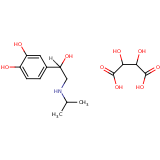| Compound Information | SONAR Target prediction | | Name: | R(-)-Isoproterenol (+)-bitartrate | | Unique Identifier: | LOPAC 00113 | | MolClass: | Checkout models in ver1.5 and ver1.0 | | Molecular Formula: | C15H23NO9 | | Molecular Weight: | 339.17 g/mol | | X log p: | 6.006 (online calculus) | | Lipinksi Failures | 1 | | TPSA | 0 | | Hydrogen Bond Donor Count: | 0 | | Hydrogen Bond Acceptors Count: | 4 | | Rotatable Bond Count: | 4 | | Canonical Smiles: | CC(C)NCC(O)c1ccc(O)c(O)c1.OC(C(O)C(O)=O)C(O)=O | | Class: | Adrenoceptor | | Action: | Agonist | | Selectivity: | beta |
| Species: |
4932 |
| Condition: |
GAS1 |
| Replicates: |
2 |
| Raw OD Value: r im |
0.6985±0.0119501 |
| Normalized OD Score: sc h |
1.1005±0.00917445 |
| Z-Score: |
4.8194±0.436704 |
| p-Value: |
0.00000337846 |
| Z-Factor: |
-0.0814779 |
| Fitness Defect: |
12.5981 |
| Bioactivity Statement: |
Active |
| Experimental Conditions | | | Library: | Lopac | | Plate Number and Position: | 8|H11 | | Drug Concentration: | 50.00 nM | | OD Absorbance: | 600 nm | | Robot Temperature: | 27.30 Celcius | | Date: | 2005-11-17 YYYY-MM-DD | | Plate CH Control (+): | 0.042300000000000004±0.00209 | | Plate DMSO Control (-): | 0.668275±0.01567 | | Plate Z-Factor: | 0.9552 |
|  png png
ps
pdf |
| DBLink | Rows returned: 5 | |
| 26792 |
2,3-dihydroxybutanedioic acid; 4-[1-hydroxy-2-(propan-2-ylamino)ethyl]benzene-1,2-diol |
| 160420 |
(2R,3R)-2,3-dihydroxybutanedioic acid; 4-[1-hydroxy-2-(propan-2-ylamino)ethyl]benzene-1,2-diol |
| 2724018 |
(2R,3R)-2,3-dihydroxybutanedioic acid; 4-[(1S)-1-hydroxy-2-(propan-2-ylamino)ethyl]benzene-1,2-diol |
| 6604115 |
(2R,3S)-2,3-dihydroxybutanedioic acid; 4-[(1R)-1-hydroxy-2-(propan-2-ylamino)ethyl]benzene-1,2-diol |
| 6852409 |
2,3-dihydroxybutanedioic acid; 4-[(1S)-1-hydroxy-2-(propan-2-ylamino)ethyl]benzene-1,2-diol |
| internal high similarity DBLink | Rows returned: 3 | |
|
